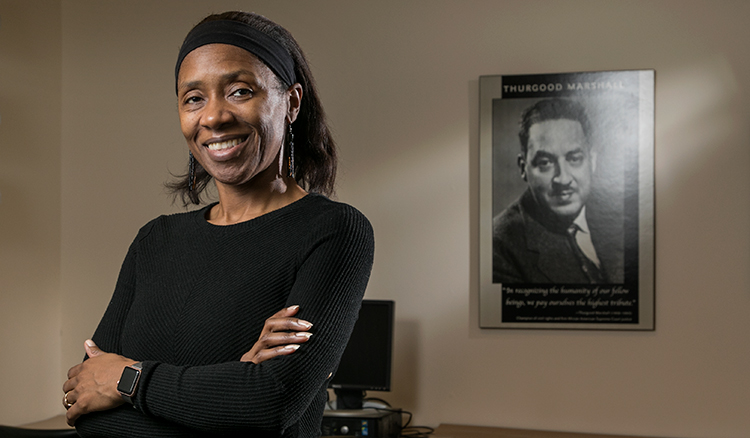 This fall, Julie Lawton plans to launch DePaul's newest legal clinic, focused on providing students with business law experience. Read on to learn about her plans for the clinic. (DePaul University/Jamie Moncrief)
This fall, Julie Lawton plans to launch DePaul's newest legal clinic, focused on providing students with business law experience. Read on to learn about her plans for the clinic. (DePaul University/Jamie Moncrief)
For seven years, Julie Lawton has shared her knowledge of and passion for the law with DePaul's College of Law. After spending eight years at Georgetown University, Lawton became a clinical professor and director of DePaul's Housing and Community Development clinic in 2011. This fall, Lawton plans to launch DePaul's newest legal clinic, focused on providing students with business law experience. Read on to learn about her plans for the clinic.
What are your goals with the business law clinic?
I'm in the process of creating the business law clinic to provide second- and third-year law students with the opportunity to serve as a business and transactional lawyer while they are still in law school. In this clinic, students will represent small- and medium-size businesses on transactional matters, meaning non-litigation matters. This can include helping an entrepreneur incorporate, drafting by-laws, negotiating contracts between businesses and vendors, advising the client on compliance issues - things of that nature.
The overall idea is to allow law students to represent actual clients on real legal issues while they're still in law school.
How will the clinic help DePaul compete in today's market?
Clinical legal education is quite commonplace at a number of law schools. Most law schools have various types of legal clinics. Most however, focus on litigation and criminal law. Here at DePaul we have a number of them, including the business law clinic, civil litigation, several criminal law clinics, and an immigration law clinic. A number of schools are growing their business legal programs.
With the addition of the business law clinic, we are in a growing area with other schools. I hope to also continue a collaboration I began last year with the Coleman Entrepreneurship Center. The Center's students are able to obtain legal assistance when beginning their entrepreneurship ventures, and our students gain legal experience. From an academic standpoint, it is a nice synergy.
From a business owner perspective, what is the importance of having legal counsel?
I like to tell my clients it's easier for me to keep you out of trouble than to get you out of trouble. Having legal counsel involved from the beginning can help the business owner craft policies and make decisions that are in line with the law. That's opposed to doing what the business owner thinks is right, but actually might run afoul of the law. It's also cheaper to consult with someone first rather than after you're in hot water.
Business owners are entrepreneurs at heart. They love the idea of their product, and they are hungry to promote it. One of the things we have to teach our students is that as lawyers we cannot be the bottleneck. We have to help protect our clients' legal issues, but we cannot block the hunger that makes an entrepreneur so successful.
What impact does clinical experience during law school have on students?
Studies have shown that lawyers who took clinics during school overwhelmingly benefit from the experience. It gives them an opportunity to learn how to be a lawyer, how to manage clients, how to identify legal issues, as well as how to balance a personal life and the professional obligations of being an attorney. It also helps them hone their legal skills.
It is incredibly important to know the theory of law and the substance of the law, but it also is very important to know about the practice of law. In legal clinics, students get to learn about all three of those aspects. I think the experience is invaluable.
What lessons learned from your previous experience will you carry into this new clinic?
I think it's beneficial to learn how to balance providing a rigorous academic experience for students with providing quality legal counsel for our clients. That is not unique to DePaul; it's a balancing act all clinicians have to do.
First and foremost, I am a professor. My clinic is housed in an academic institution. Making sure my students have a rigorous academic experience is my priority. However, I also have an equally important ethical obligation to our clients to ensure we address and protect their legal issues, and that they receive proper legal counsel.
The experience of running my previous clinic will be instructive to running this clinic. I am thrilled at the opportunity to create another clinic and to devise a new academic experience that will be helpful for our students.